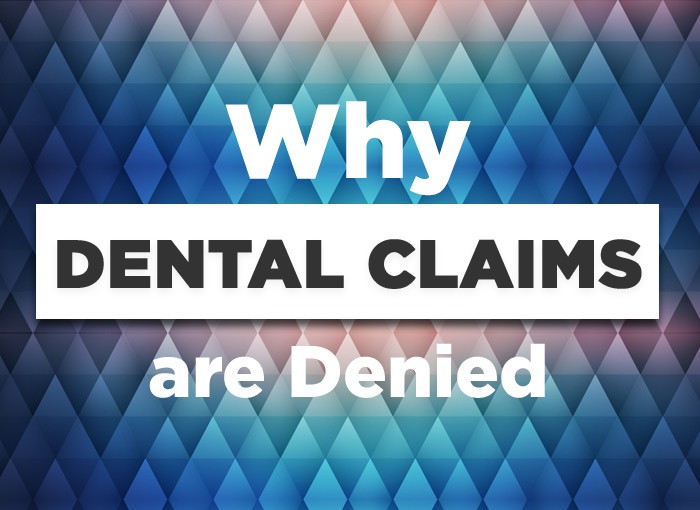Top 5 Reasons why Dental Claims are Denied
A 50% of the revenue for in-network personal exercise dental comes from dental insurance claims, says Ontario Academy of General Dentistry. So while claims are constantly denied, that’s half of your sales put at threat. With your cash flow on the line, you need to recognize why claims are denied, so that you can take action, get paid, and experience regular sales month after month.
Like any other area of practice in medicine, dental practice treats hundreds of patients claiming to have health care insurance. As per the American Dental Association’s survey, approximately 65% of insured patients visit dentists for both major and minor dental treatments. Therefore, healthcare providers need to avoid denial of dental claims to get maximum reimbursement on time.
The following are the top five reasons resulting in the denial of Dental Claims.
Incorrect Patient Information: A lot of providers tend to ignore the errors in the dental claims form. Ignoring incorrectly filled patient information such as misspelled names, wrong insurance details, etc is one of the major causes leading to a denial of dental claims. It is because, in a world of technology, most of the claims are rejected by the software itself due to mismatched information. So, it is better to avoid errors in the claims form by opting for electronic claims transmission.
Patient information errors remain one of the leading causes of claim denials in dental practices. These errors can include:
- Misspelled names
- Incorrect insurance identification numbers
- Wrong date of birth
- Outdated insurance information
- Inaccurate subscriber details
Modern practice management systems now offer automated verification tools that can significantly reduce these errors. Implementing electronic claims transmission can cut error rates by up to 50%, according to recent industry data. To prevent these issues, practices should:
- Double-check all patient information during each visit
- Implement regular staff training on data entry protocols
- Use automated verification systems
- Establish a quality control process for claims submission
Delay in filing Claims: With so many insurance carriers it is quite tough to keep track of deadlines to file claims. A lot of providers fail to file claims on time as they struggle to manage dental practice and administrative tasks together. The only way to resolve this problem is to outsource dental claim services from a medical billing company. Getting professional assistance from a trained medical biller will result in the timely filing of claims. Also, the professional will ensure that the filed claims are followed in case of any rejection or delayed payment. Modern solutions include:
- Implementing same-day claims submission protocols
- Utilizing automated reminder systems
- Establishing clear filing deadlines for staff
- Partnering with professional dental billing services
- Creating a dedicated claims-tracking system
Failure in getting Pre-Authorization: This is an extremely important step that providers tend to miss due to the extreme workload. However, it is beneficial no longer to overlook pre-authorization. Getting pre-authorization for dental treatment is the best way to ensure compensation. Without pre-authorization, the insurance payer may deny the charge for the dental remedies even though they may be protected by the insurance plan.
Pre-authorization requirements have expanded appreciably, with many processes now requiring advance approval. A comprehensive pre-authorization strategy should include:
- Maintaining updated lists of procedures requiring pre-authorization by carrier
- Implementing automated pre-authorization tracking systems
- Documenting all authorization communications
- Creating a pre-authorization calendar
- Establishing clear staff responsibilities for authorization management
Non-Coverage of Treatment: It has been noticed that many providers fail to cross the insurance plan agreement for covered treatments. A patient may visit you claiming to have insurance coverage for any dental treatment. However, as a provider, you must ensure the coverage of dental treatment(s) beforehand. Failure to accomplish that will affect your corporation’s revenue cycle because the coverage payer isn’t always prone to pay for treatments that fall outside the coverage plan/coverage. Understanding coverage insurance boundaries is important for preventing denials. Practices have to:
- Maintain updated coverage matrices for common insurance plans
- Verify specific procedure coverage before treatment
- Document all coverage verification activities
- Provide detailed treatment plans with coverage information to patients
- Implement regular staff training on insurance policies
Skipping Insurance Verification: Sometimes it so happens that a provider performs an intense dental procedure without cross-checking the patient’s claims to have an insurance plan. Later on, when the provider files the claim the insurance payer denies payment due to the non-verification of the said claim. In such a case, the provider will likely face a huge loss due to an inactive insurance claim. Therefore, providers must not skip insurance verification to prevent denials and/or fraud. Insurance verification has become more complex with the proliferation of plan types and coverage options. Essential verification steps include:
- Verifying coverage 48-72 hours before appointments
- Documenting verification details
- Confirming specific procedure coverage
- Checking for plan-specific limitations
- Verifying remaining benefits and deductibles
In addition to the above, the Coordination of Benefits (COB) also tends to result in the denial of dental claims.
Failure to Cross-check COB
It may seem to be a minor step but it is essential to ask your patient about having multiple health care insurance plans. This information is valuable in billing the primary and secondary insurance payers after knowing the COB they share.
Impact of Dental Claims Denials on Practice Revenue
Studies show that dental practices lose an average of 9% to 11% of their potential revenue due to claim denials. While some denials are inevitable, research indicates that up to 90% of denied claims are preventable with proper documentation and submission procedures. Understanding the financial impact of denials is crucial for implementing effective prevention strategies.



